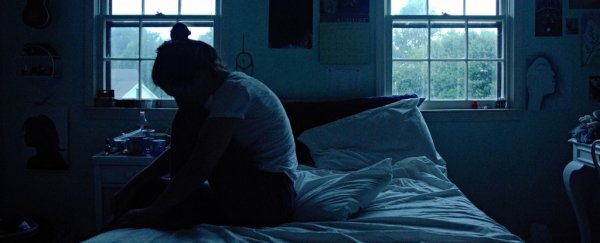For those who suffer from clinical depression, there could be an unexpected source of solace.
While long-term sleep deprivation and chronic insomnia can harm your mental and emotional health, in the short term, evidence suggests, going without sleep can help.
Previous studies since the 1970s have noted a correlation between reduced REM sleep and improved depression symptoms. A 2002 study found that one whole night of sleep deprivation resulted in an improvement in 40-60 percent of patients, as did another one in 2010.
A 2013 study attempted to find the mechanism, linking the effect to a type of brain cell that releases a protein important for sleep.
Now a meta-analysis of 66 independent studies conducted between 1974 and 2016 has found that sleep deprivation rapidly reduces the symptoms of depression in roughly half of patients, at least when conducted in controlled inpatient settings.
Not only does this meta-analysis, the first on the subject, refine the percentage, it helps narrow down which patients could attain relief from sleep deprivation.
"More than 30 years since the discovery of the antidepressant effects of sleep deprivation, we still do not have an effective grasp on precisely how effective the treatment is and how to achieve the best clinical results," says senior researcher Philip Gehrman from University of Pennsylvania.
"Our analysis precisely reports how effective sleep deprivation is and in which populations it should be administered."
The 66 studies included in the meta-analysis conducted experimental sleep deprivation, reported the percentage of the sample that responded to sleep deprivation, provided a priori definition of antidepressant response, and did not seamlessly combine sleep deprivation with other therapies, the study's abstract reports.
There were also different types of sleep deprivation represented, including total and partial, as well as short term and longer term.
The team found that partial sleep deprivation, in which the patient was only allowed to sleep for 3-4 hours for one night followed by forced wakefulness for 20-21 hours, was just as effective at reducing depression symptoms as total sleep deprivation for 36 hours.
The overall response rate was 45 percent for studies with a control group, and 50 percent for studies without a control group.
"These studies in our analysis show that sleep deprivation is effective for many populations," says lead researcher Elaine Boland from The Corporal Michael J. Crescenz VA Medical Center.
"Regardless of how the response was quantified, how the sleep deprivation was delivered, or the type of depression the subject was experiencing, we found a nearly equivalent response rate."
That there's a correlation between sleep deprivation and an improvement in symptoms doesn't mean that it can replace other treatments, though. Several studies have found that the effect only lasts as long as the patient stays awake following the sleep deprivation for up to 80 percent or more of respondents.
Moreover, the researchers still don't know why sleep deprivation seems to result in a rapid and significant decrease in depression symptoms.
"These findings support a significant effect of sleep deprivation and suggest the need for future studies on the phenotypic nature of the antidepressant response to sleep deprivation, on the neurobiological mechanisms of action, and on moderators of the sleep deprivation treatment response in depression," they wrote in the paper.
The research has been published in The Journal of Clinical Psychiatry.
